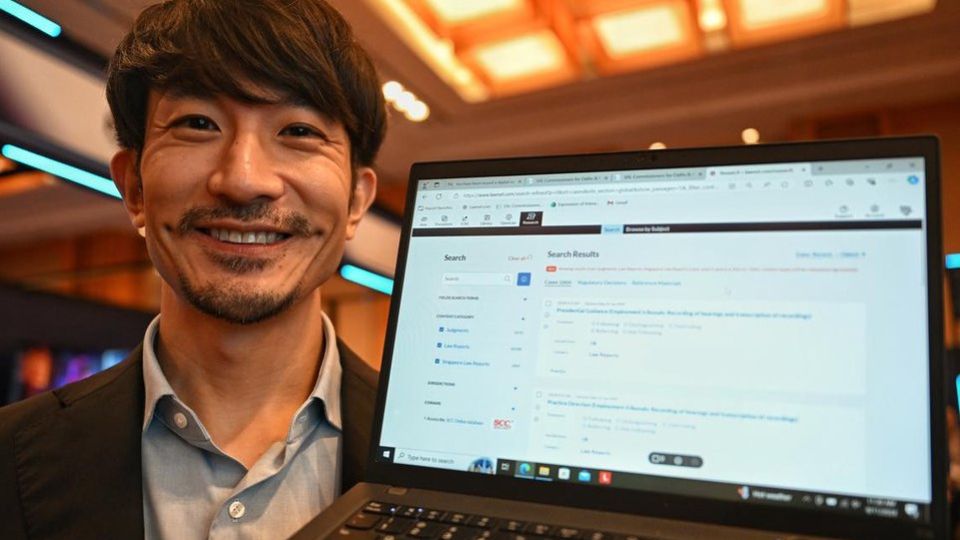July 25, 2025
SINGAPORE – As part of a concerted push to become an artificial intelligence-savvy nation, there are plans to nurture a large pool of AI users across various sectors in Singapore’s 3.5 million strong workforce.
These AI early adopters – who could be lawyers, accountants, doctors – will show their peers how the technology can be useful for daily tasks, said Minister for Digital Development and Information Josephine Teo at an AI conference on July 22.
The size of this pool of users will have to far exceed the 15,000 AI practitioners that Singapore already aims to nurture and hire, Mrs Teo said, detailing how small states can compete on the global AI stage dominated by big boys such as the US and China.
Singapore has already taken small steps in various sectors. Here are some early developments:
1. Banking – AI coach provides career development advice
In July, South-east Asia’s largest lender DBS Bank launched a virtual career coach developed with an external vendor to help its staff figure out future career moves within the bank and the necessary training to accompany the moves.
Powered by generative AI, this chatbot can pick out potential career shifts and give advice on what needs to be done to qualify for the dream role. The answers are customised based on the chatbot’s understanding of an employee’s current role, skill sets and personal motivation.
It is also able to provide tips on how to demonstrate sought-after traits for such roles, and highlight the available support for formal training they may need.
iCoach was trained on the banks’ career development-related resources and advice from top leadership coach Marshall Goldsmith. The chatbot is available for use round the clock for employees in Singapore, Indonesia, China, Taiwan, Hong Kong and India to start with. The bank has around 41,000 employees across 19 markets currently.
2. Legal – AI service summarises case judgments for efficiency
A new feature called LawNet AI, launched in 2024, has allowed around 6,000 lawyers in Singapore to say goodbye to sifting through endless walls of text contained within thousands of case judgments to prepare for their own cases.
The Singapore Academy of Law and Infocomm Media Development Authority jointly developed the AI service, which can summarise case judgments that mostly exist as lengthy transcripts.
It is accessible to users of the LawNet legal research portal, which nearly all lawyers subscribe to for looking up past cases and conducting research.
Hundreds of AI-generated results were reviewed by justices’ law clerks to reduce the risks of the AI service generating incorrect or nonsensical results. The reviewed copies were then fed back into the system, to increase its accuracy rate.
Text in the generated summary is labelled with reference to the original sources, to help users fact-check the information with ease.
3. Healthcare – AI service helps nurses structure handover notes accurately
It often takes up to one hour to hand over information about patients between shift changes. But an AI tool is being trialled at Alexandra Hospital to cut down the time taken to generate handover notes. CareScribe helps to summarise and structure handover notes for the incoming nursing shift, so nurses can use the time saved to tend to patients.
“Most handovers are currently conducted through verbal communication with handwritten documentation, which can present challenges in maintaining consistency and completeness,” said Dr Ravi Shankar, principal investigator and research fellow at Alexandra Hospital’s medical affairs research office.
CareScribe, which currently can be accessed via a webpage, allows nurses to upload photos or voice notes, which are then transcribed and summarised in a structured format. The notes are organised in an ABCDEFG template, which stands for acuity assessment, background history and behaviour, conditions and care plans, drugs, equipment, family and goals.
Critical clinical information – such as patient safety alerts, medication-related updates and scheduled procedures – is also highlighted by the system.
4. Aviation – AI eye in the sky to scan airport runways for safety

NCS Engineering Engineering Enterprise Project and Service Leadership co-lead Samuel Tan Pheng Seong (left), with his team, introducing iFerret. PHOTO: THE STRAITS TIMES
Through a series of high-definition cameras, an AI system used at Changi Airport helps to scan the runways for any debris or foreign objects that can damage aircraft or disrupt flights.
Dubbed iFerret, the system can pick up on a variety of interference such as metal parts, wildlife, animal carcasses and other objects as small as 4cm round the clock.
“When it comes to flights, the most critical period is take-off and landing, and even something as small as a monitor lizard can be a disruption and impact the process,” said a spokesperson for technology services provider NCS, which collaborated with Changi to develop the system.
iFerret acts as an extra set of eyes for air traffic controllers, instead of relying only on airport staff who scan the runways several times daily. It is also trained to avoid flagging images that are false alerts, such as reflections on a damp runway.

